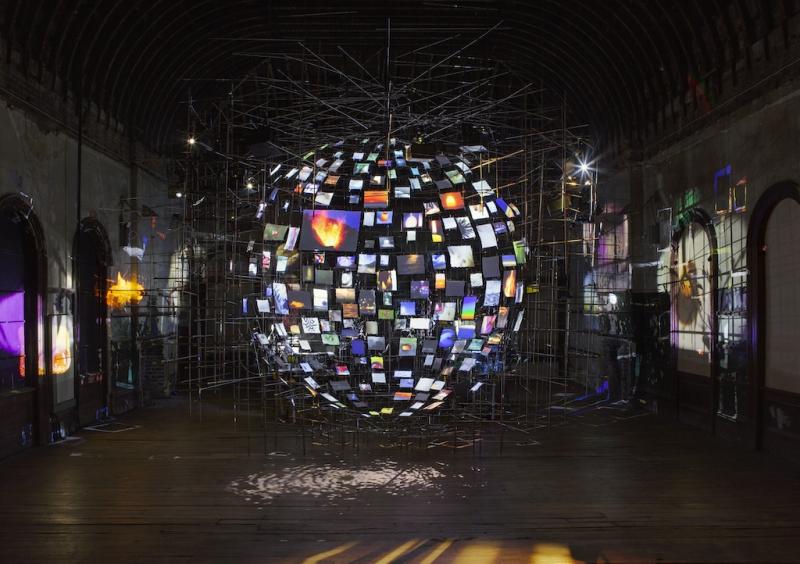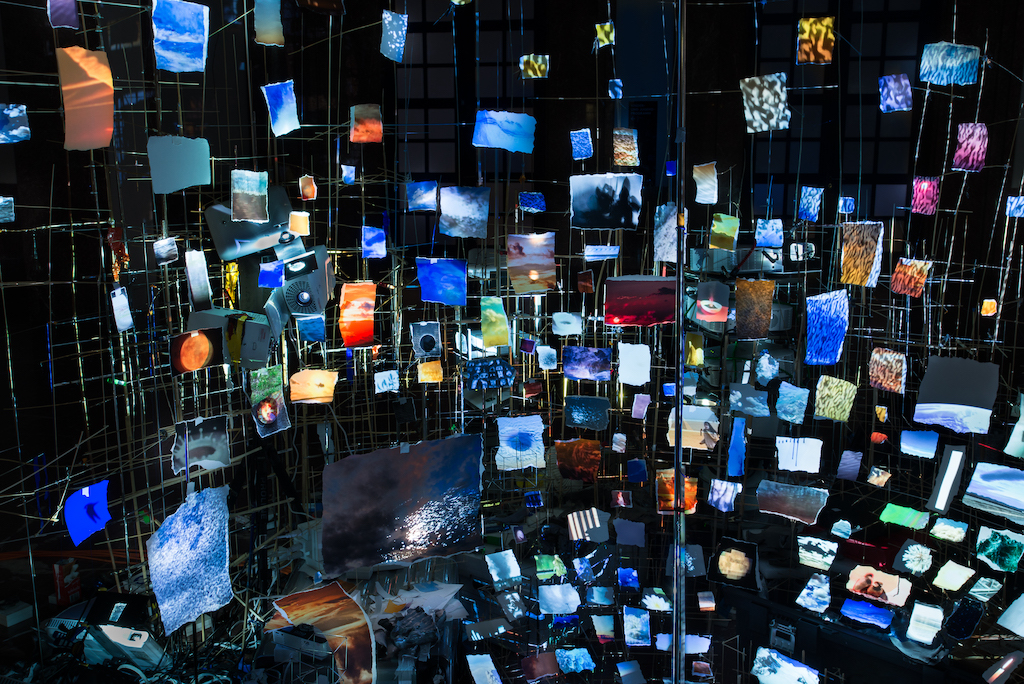Sarah Sze: Metronome, Artangel at Peckham Rye station review - an installation of visual complexity and physical simplicity | reviews, news & interviews
Sarah Sze: Metronome, Artangel at Peckham Rye station review - an installation of visual complexity and physical simplicity
Sarah Sze: Metronome, Artangel at Peckham Rye station review - an installation of visual complexity and physical simplicity
The detritus that accumulates in our over-stimulated brains

One of the great things about Artangel is the interesting sites which they seek out for the artworks they commission. The latest find is the disused waiting room at Peckham Rye station, a once gracious space with a vaulted ceiling, arched windows and two fireplaces, now ripped out. The space was later converted into a billiard hall, the sign for which is still visible on the staircase wall, but when that closed down in 1962, the room was left to rot.
Artangel always works with top notch artists, the latest of whom is the American Sarah Sze. It’s 25 years since she created an installation in the Upper Gallery at the ICA. The bric a brac of daily life – biros, matches, Q tips, plastic forks, milk cartons, batteries and pins – clung to the ceiling, while at one’s feet were mundane things like loo rolls needed to keep the arts centre running.
In her new installation, Metronome, the actual has mainly been replaced by the digital. In the centre of the darkened room, you see what looks like a huge glitter ball. On closer inspection, the shining globe turns out to be a concave structure made from a grid of slender steel rods to which are attached dozens of small sheets of paper.
These act as screens for the projection of multiple images, which include an erupting volcano; waves and choppy seas; clouds and the moon; steam rising; riggling bacteria; hands kneading dough and doing card tricks; rice being poured; a woman, an ostrich and a rhino running, a stag looking statuesque and a hawk gliding.
The writer Zadie Smith compared this experience to being in an opened-up iPhone with the images stored in its memory all exploded into three-dimensional space. Her description makes perfect sense, since most of the images are the kind of clichés that give people enormous pleasure. You could think of them as the detritus that is accumulating in our over-stimulated brains, or the digital equivalents of mundane objects like Q tips and office supplies. The accompanying sounds – a metronome and a heart beat – are similarly obvious.
The same images are projected onto the walls where they circle round in a banal yet tantalising dance. Then, suddenly, the space comes alive with thousands of birds in flight, a sight so uplifting that it jolts you out of the torpor induced by our constant exposure to visual images. And you realise that the capacity for wonder has not, as yet, been totally snuffed out.
 Behind the hemisphere are two towers of white projectors surrounded by wire branches bearing leaves cut from waxy white paper. Littering the white tables are the materials used to build the installation – paper, steel wire, scissors, sticky tape, pencils and so on.
Behind the hemisphere are two towers of white projectors surrounded by wire branches bearing leaves cut from waxy white paper. Littering the white tables are the materials used to build the installation – paper, steel wire, scissors, sticky tape, pencils and so on.
For me, the most interesting aspect of Sze’s installation is the contrast between its visual complexity and the simplicity of its construction. When nearly everything can be sourced digitally from the net, her recourse to scissors, wire and cellotape feels very welcome – something to anchor you in the real world and prevent you floating off into a virtual wonderland.
rating
Explore topics
Share this article
The future of Arts Journalism
You can stop theartsdesk.com closing!
We urgently need financing to survive. Our fundraising drive has thus far raised £49,000 but we need to reach £100,000 or we will be forced to close. Please contribute here: https://gofund.me/c3f6033d
And if you can forward this information to anyone who might assist, we’d be grateful.

Subscribe to theartsdesk.com
Thank you for continuing to read our work on theartsdesk.com. For unlimited access to every article in its entirety, including our archive of more than 15,000 pieces, we're asking for £5 per month or £40 per year. We feel it's a very good deal, and hope you do too.
To take a subscription now simply click here.
And if you're looking for that extra gift for a friend or family member, why not treat them to a theartsdesk.com gift subscription?
more Visual arts
 'We are bowled over!' Thank you for your messages of love and support
Much-appreciated words of commendation from readers and the cultural community
'We are bowled over!' Thank you for your messages of love and support
Much-appreciated words of commendation from readers and the cultural community
 Folkestone Triennial 2025 - landscape, seascape, art lovers' escape
Locally rooted festival brings home many but not all global concerns
Folkestone Triennial 2025 - landscape, seascape, art lovers' escape
Locally rooted festival brings home many but not all global concerns
 Sir Brian Clarke (1953-2025) - a personal tribute
Remembering an artist with a gift for the transcendent
Sir Brian Clarke (1953-2025) - a personal tribute
Remembering an artist with a gift for the transcendent
 Emily Kam Kngwarray, Tate Modern review - glimpses of another world
Pictures that are an affirmation of belonging
Emily Kam Kngwarray, Tate Modern review - glimpses of another world
Pictures that are an affirmation of belonging
 Kiefer / Van Gogh, Royal Academy review - a pairing of opposites
Small scale intensity meets large scale melodrama
Kiefer / Van Gogh, Royal Academy review - a pairing of opposites
Small scale intensity meets large scale melodrama
 Jenny Saville: The Anatomy of Painting, National Portrait Gallery review - a protégé losing her way
A brilliant painter in search of a worthwhile subject
Jenny Saville: The Anatomy of Painting, National Portrait Gallery review - a protégé losing her way
A brilliant painter in search of a worthwhile subject
 Abstract Erotic, Courtauld Gallery review - sculpture that is sensuous, funny and subversive
Testing the boundaries of good taste, and winning
Abstract Erotic, Courtauld Gallery review - sculpture that is sensuous, funny and subversive
Testing the boundaries of good taste, and winning
 Edward Burra, Tate Britain review - watercolour made mainstream
Social satire with a nasty bite
Edward Burra, Tate Britain review - watercolour made mainstream
Social satire with a nasty bite
 Ithell Colquhoun, Tate Britain review - revelations of a weird and wonderful world
Emanations from the unconscious
Ithell Colquhoun, Tate Britain review - revelations of a weird and wonderful world
Emanations from the unconscious
 Rachel Jones: Gated Canyons, Dulwich Picture Gallery review - teeth with a real bite
Mouths have never looked so good
Rachel Jones: Gated Canyons, Dulwich Picture Gallery review - teeth with a real bite
Mouths have never looked so good
 Yoshitomo Nara, Hayward Gallery review - sickeningly cute kids
How to make millions out of kitsch
Yoshitomo Nara, Hayward Gallery review - sickeningly cute kids
How to make millions out of kitsch
 Hamad Butt: Apprehensions, Whitechapel Gallery review - cool, calm and potentially lethal
The YBA who didn’t have time to become a household name
Hamad Butt: Apprehensions, Whitechapel Gallery review - cool, calm and potentially lethal
The YBA who didn’t have time to become a household name

Add comment